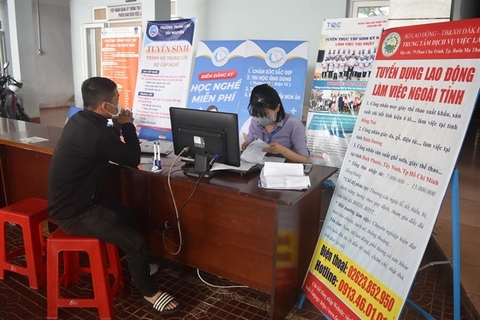
A job-seeker looks for information and advice at a job centre in Dak Lak Province. — VNA/VNS Photo Nguyen Dung
The Prime Minister has called for tough measures to keep the labour market stable as the economy is drawing close to the end of the year.
At a recent cabinet meeting, PM Pham Minh Chinh asked the Ministry of Labour, Invalids and Social Affairs (MOLISA) to conduct a review of the labour market and come up with measures to keep labour supply-demand balance.
The PM said the measures should be aimed at improving workers' financial position, supporting disadvantaged ones, reducing labour disputes, and curbing late wage and bonus pay before Tet.
In response to the PM's directive, a representative from the Department of Industrial Relations and Wage, MOLISA, said his department was keeping a regular check on firms' staff turnover and taking actions to facilitate job matching.
The department was also cooperating closely with local authorities in supporting disadvantaged workers, especially those who have been rendered jobless prior to the New Year celebration.
"For laid off workers, we have requested labour centres to help them find new jobs and establish a stable labour relation with their new employers," said the director of the department.
A MOLISA census shows that 528 firms have been hard hit by falling orders. The weakening demand has put 637,000 workers on the line, of which 53,000 have lost their jobs.
Some firms just cannot sit tight watching their workers feel the pinch of the unfavourable economic situation. They have dug deep into their pockets to offer huge bonuses to staff despite falling orders.
Nguyen Ba Tuong, labour union president of the Chang Shuen Company LTD, claimed that his company has set a large portion of its earnings aside for the thirteen-month pay and other bonuses to its workers, a move to keep their loyalty to the company.
"These end-of-year wages and bonuses make us really happy," said a worker from the company.
Firms said the government's recent favourable policies, including tax cuts and the uplifts in credit caps, have given them the much-needed finance to stay afloat and keep their workers on the payroll.
Nguyen Thanh Do, head of the Department of Policy and Law, HCM City's Confederation of Labour, said 102,000 workers in the city have had their work hours cut and 6,000 have been made redundant.
In the face of such a situation, he called for low-interest bank loans to help firms in financial difficulty maintain their operations. He also called for a large relief package to support workers who have faced the axe or had their labour contracts suspended.
The HCM City Labour Union said it would allocate VND140 billion (US$5.9 million) to support workers in their Tet preparations. The package would come in the form of gifts, free train tickets, and other items.
"We will provide assistance and care to disadvantaged workers and relieve their anxiety over job losses," said the union's Vice President Tran Doan Trung.
The Vietnam General Confederation of Labour (VGCL) said it would follow suit with a package of VND500 billion, which is being distributed among localities. About one million workers are eligible for the package with each entitled to a lump sum of VND500,000.
It is also worth noting that a VGCL survey of 6,200 workers between October and November shows that 11.7 per cent of the workers would not be able to stay afloat for longer than one month if they lose their jobs.
The figure rises to 16.7 per cent for workers who can stand the situation for one to three months and 12.7 per cent for those who can make it to more than three months.
Remarkably, about 38 per cent of the workers find themselves in the red and 14 per cent are unable to repay their debts at due dates.
Nguyen Dinh Thang, labour union vice president of the Hanoi Industrial and Export Processing Zones, was concerned that the situation would be worse in reality than in the survey.
He said workers normally worked overtime to boost income in the late months of the year. However, they cannot do so this year because of falling orders, resulting in a plummet in their incomes.
The president urged the government to offer more training to the workers to help them enhance their skills, thereby improving their incomes. He also called for more favourable policies, including tax cuts and low-interest bank loans, to help firms maintain their operation and retain their workers.
Bright spots are firms that have been untouched by falling orders. They have been recruiting additional workers to expand production in the late months of the year. Some noteworthy ones include 38 firms in Binh Duong Province that are seeking 10,000 new staff.
Labour unions are planning to hold 22 marketplaces across the country this year, at which workers could buy essential items with a discount of 15 per cent or at zero dong. They are also calling for more finance to be able to support more workers. — VNS